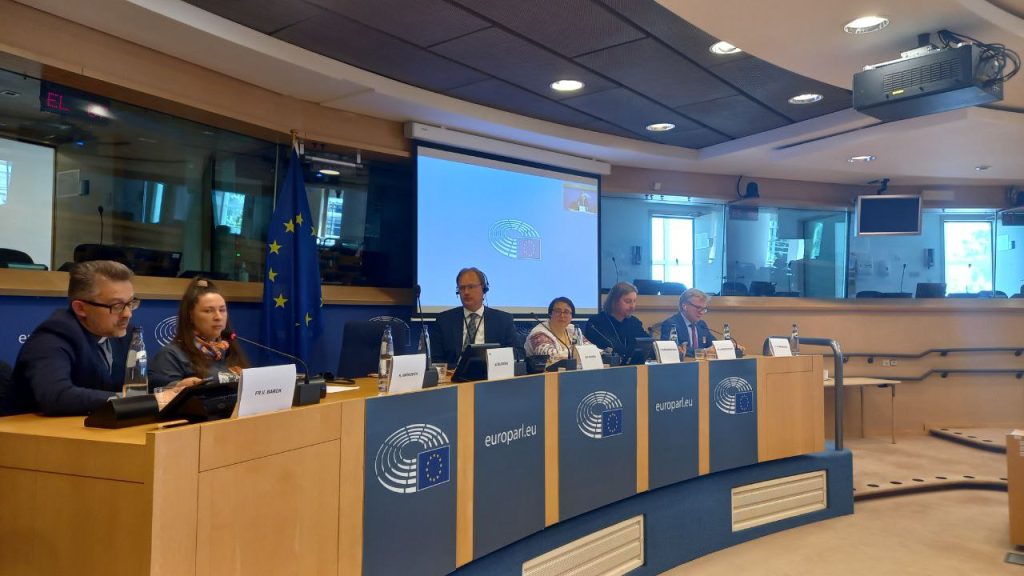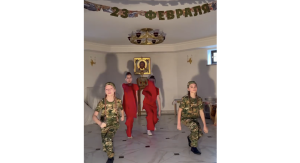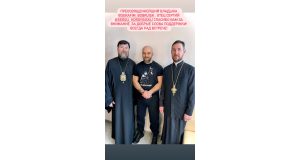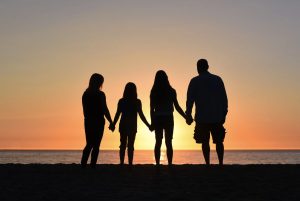Valeryja Charnamortsava. Being a Political Prisoner in Belarus: A Personal Experience


ВалерыяЧарнаморцава
Праваслаўная верніца, арганізатарка культурніцкіх вандровак, даследчыца вуснай гісторыі савецкіх рэпрэсіяў у Беларусі, удзельніца групы “Хрысціянская візія”.

Life and Faith Under Oppression: Voices from Political Prisoners and the Persecuted Belarusian Christian Communities. Brussels, European Parliament, 31.05.2023.
Valieryja Charnamortsava, a researcher of Gulag prisoners, member of the Christian Vision group
1. Unfortunately, contemporary Belarus is a large concentration camp, a small, reconstructed GULAG or, as people mockingly say, LULAG.[1] As in the Soviet era, anyone inside the country can be violently arrested, accused of fictitious crimes without any evidence, and imprisoned for years or even decades. Regardless of their conditions, political prisoners in Belarus include the retired, sick, disabled, and mothers of many children. Currently, in our country there is no law at all, no human rights, or any norms of morality and humanism.
The death penalty in Belarus has not been abolished, and the political prisoners can soon expect their death sentences. Being a political prisoner in Lukashenka’s Belarus is comparable to being a Jew in a Nazi concentration camp: in the places of imprisonment, even yellow tags are sewn on the clothes of “political prisoner”, as they used to do this in those times.
A bit of my own experience.
2. I, like many Belarusians, was arrested in my own apartment on October 18, 2022. In the morning the policemen simply kicked out the doors, at gunpoint they ordered me to lie on the floor and handcuffed me. For many years I collected the memories of former prisoners of Stalin’s Gulag and assumed that I was mentally prepared for the moment when the heirs of Stalin’s NKVD would burst into my apartment. But you can’t be entirely ready for this. This method of arrest is justified only in relation to armed terrorists, while I am an unarmed civilian, a guide and researcher of the memories of the victims of Stalin-era repressions. Yet for them we are all but terrorists and extremists.
3. I was arrested by the KGB – in Lukashenska’s Belarus the Soviet name has not even been changed. However, I think that I had been lucky being arrested by them, and not by the so-called Gu(B)AZIK[2], who are real bandits and terrorists, for I personally:
– was not being kicked on the kidneys,
– was not handcuffed to the radiator,
– was not tortured with a taser,
– was not forced to record a “repentance video”,
unlike other political prisoners. All these was told to me by other arrested girls and women who were together with me in the prison cell.
4. I had to provide my cellphone password to the policemen in exchange for being able to dress properly, since I was still sleeping in my nightdress just before the arrest, and I had to change in front of them. The reason for this was that in the Akrestsina temporary detention center one is forbidden to receive any change of clothes – you remain in what you are wearing at the moment of arrest.
5. The KGB officers informed me that they were arresting me not so much for the protests of 2020, but for organizing of guiding tours to Kurapaty, the infamous place of mass executions in Minsk in 1937. Meanwhile, the officers who arrested me boasted that they use to travel to Vilnius and visit the KGB museum there. At the same time, a large amount of money about 2 months’ salary has been stolen from me, which was not recorded.
6. After the arrest and interrogation, I was brought, or rather convoyed, to one of the most terrible places of detention – the notorious pre-trial detention center on the Akrestsina street in Minsk. The transporting of prisoners under guard is also a kind of torture, since up to 4 people are stuffed into the so-called “glasses” which are as small as elevator’s cabin, sometimes without light, and are kept there for a long time. That was where I began experiencing panic attacks. I was lucky because I spent in Akrestsina only 10 days, while others are kept there for months. They make a kind of “conveyor”: the arrested are sentenced to 15 days by online “trials”, and then they are arrested again. For example, the human rights activist Nastya Loika spent 60 days there, Paval Sevyarynets spent 75 days in 2020, and the Orthodox priest Vladislav Bogomolnikov spent 110 days.
I have already said that they do not provide change of clothes there. Hygiene products such as toothpaste, toothbrushes, even toilet paper and sanitary pads on critical days are also banned for political prisoners, except for hard soap that makes your hair fall out. In a cell fit for only two persons, there were always 7-8 people deprived mattresses and bedsheets, so we had to sleep on the bare floor, which always had not enough room for us all. When the jailer received another order to punish the political prisoners even more, they transferred alcohol and drug addicts to us from another cell. For some time, there were 19 people in the 2-persons cell! I and others began to lose consciousness.
7. A special type of torture is the refusal to provide medical assistance to the imprisoned. The heart rhythm disturbance and hypertensive emergency is not a reason to call an ambulance since it is necessary to provide security. Medicine is in short supply and medical deliveries are prohibited! Therefore, it is not surprising that political prisoners can die behind the bars, as a recent example of Nikolai Klimovich who died on May 7 this year, suffering from heart decease.
8. After Akrestsina, I was transferred to the Pre-trial Detention center No. 1 on Volodarsky Street in Minsk, known as the 200-year-old Pishchalsky Castle. In the 19th century cells the humidity is so high that your clothes don’t dry, and prisoners are more afraid of contracting tuberculosis than HIV. Human rights activist Maria (Marfa) Rabkova from my cell spent two and a half years in such conditions and now she is suspected of having thyroid cancer. In an even more humid cell next to the shower, the Nobel laureate Ales Byalyatsky was kept for a year and a half. By the way, there was a time when 7 people were kept in our cell on political charges, yet only Masha Rabkova and I were recognized as political prisoners. Now about half a thousand prisoners in this place are detained for political reasons, and there are 5 more pre-trial detention centers, 26 prison camps and 3 prisons where the situation is almost the same. Therefore, I consider the number of 1500 political prisoners counted by human rights activists in Belarus to be 4-5 times less than it really is. The conditions are terrible, as the imprisoned are allowed to take a shower only once a week, the rest of the time the water is only cold and of bad quality, and the drinking water is not provided at all. Non-smokers are kept together with those who smokers, while the latter are forced to spoke inside the cells. I suffered a lot because of this, and my blood pressure was critical and did not go down.
9. As a Christian believer, I was able to take a small Gospel with me when I was arrested, but I was not allowed to take it with me to the cell at Akrestsina, they gave it to me only after the transfer to the pre-trial detention center. The visits by priests, religious services, and communion were out of the question, even at Christmas, which I spent behind bars. The holiday celebrations are prohibited too. It is on Christmas and New Year that the most terrible jail “shakedowns”, the so-called “shmon”, are taking place. Neither a Christmas star, nor even an imitated Christmas tree branch were not allowed, and stars made of paper were torn and thrown away during the shakedown. Yet many people in these conditions do not give up, they pray and support each other.
10. As a researcher of Stalin’s repressions, who recorded about fifty memoirs of former Gulag prisoners, and then had my own experience of similar kind, I can testify that in fact the repressive system has changed little since the Soviet times. Thanks to many prayers for me, I was very lucky to be able to be released from imprisonment after being sentenced to probation, the so-called “home chemistry”, which allowed me to be evacuated to safety in a European country. However, several thousand political prisoners (we do not know the exact number) are still being held in inhuman conditions behind bars in Belarus. Practically, they are imprisoned just for the fact that in 2020 they made their choice in favor of democracy and European values. And they continue to live and believe that they will be released soon. I am speaking now as their voice and urge you and all Europeans not to forget us. For three years since 2020, the situation in Belarus has only changed for the worse, with intensifying repressions and terror against its own people. I implore you to do everything possible so that all political prisoners, without exception, are released and rehabilitated, and the criminal inhuman regime of Lukashenka and the direct perpetrators of the torture of innocent people are convicted. Freedom to all political prisoners of Belarus!
[1] A pun which joins the first two letter of surname “Lukashenko” to LAG (abb. “lager” – camp). (translator’s note).
[2] Main Directorate for Combating Organized Crime and Corruption of the MVD of the Republic of Belarus (translator’s note).








